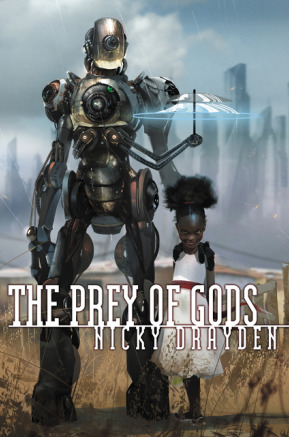Each year, Sirens chair Amy Tenbrink posts monthly reviews of new-to-her books from the annual Sirens reading list. You can find all of her Sirens Book Club reviews at the Sirens Goodreads Group. We invite you to read along and discuss!

If you ask me, on any given day, which characteristics I admire in someone (but especially in a woman), ambition will always make my top three. I like people who dream big and bold and bright. I like people who think six impossible things before breakfast. I like people who try to change the world.
And what The Prey of Gods is, more than anything, is ambitious.
Nicky Drayden’s first novel is a science-fiction/fantasy mash-up, a living mythology, an AI fever dream, a breakneck romp to the brink of apocalypse that is also—improbably, shockingly—funny. Nicky Drayden dreamed big and bold and bright, y’all.
We’re in a near-future South Africa: Personal robots abound, the government has scaled renewable energy, genetic engineering is a coveted industry. Yet, vast class and identity striations still exist: Rural villages struggle with basic needs, those personal robots certainly aren’t a societal entitlement, and several of the characters struggle with acceptance of their sexuality or gender presentation. And beneath the surface roil surprising challenges: a new hallucinogen, a sentient AI uprising, and a living goddess who wants (what else?) to take over the world.
In many ways, The Prey of Gods is a smart, cleverly structured Scooby Gang book: a group of seemingly random people, meeting purportedly by happenstance, saves the world. The cleverness here is taking those seemingly random people, most of whom don’t know each other at the beginning of the book—and one, for heaven’s sake, that speaks only binary at the beginning of the book—and constructing a plot that brings these people, with their unique talents, together at the right time to save the world. Drayden will see your Buffy-style these-are-my-friends Scooby Gang and raise you a cast-of-strangers Scooby Gang.
Toward that end, The Prey of Gods features six—count ‘em, six—point-of-view characters of different races, different sexualities, different genders, and different classes.
- Muzi: a queer teenaged boy who can control minds and who is in (not-yet-confessed) love with his best friend
- Nomvula: a ten-year-old girl with impossible powers that she doesn’t know how to control, who destroys her entire village early in the book
- Wallace Stoker: a city councilman on the rise whose feminine alter ego is still secret
- Riya Natrajan: a world-famous pop star with issues of her own, not the least of which is her physical relationship with her drug dealer
- This Instance/Clever 4-1: a personal robot whose first thought is to worry about Muzi, and whose second thought is to worry about the fact that it’s worried
- Sydney: the current incarnation of an ancient demigoddess
The Prey of Gods also features 59—count ‘em, 59—chapters in only 377 pages.
Hang on, I’ll do the math for you: That averages out to 6.39 pages per chapter, and 62.83 pages per point-of-view character. And I’m deeply conflicted about those numbers.
On one hand, The Prey of Gods reads like an accelerant. Those short chapters, their cliffhanger endings, and the constantly shifting points of view combine to make this read very much like the world is on fire. The pacing lends a highly skilled immediacy to the book, especially as you see the pieces start to come together.
On the other hand, I usually struggle with multiple points-of-view books, and I found the sheer number of point-of-view characters in The Prey of Gods and the constantly shifting viewpoints to be a huge challenge as a reader. In the end, I didn’t end up identifying with or liking or wanting to know more about most of the point-of-view characters. (Though I liked the robot a lot. Like, a lot a lot.) And I’m trying to reconcile that with the fact that there are characters with whom I’ve spent fewer pages (say, in short stories) that I love and why, in a larger work, 62.83 pages was so wholly insufficient. (I also really liked the drug dealer and he’s hardly on the page!)
So where I come out is this: I greatly, deeply admire Drayden’s ambition. To envision a realistic world, set in the near future, that includes both sentient AI and a living mythology, and then to envision that world saved by an almost random group of often-marginalized people is an act born of tremendous ambition. The Prey of Gods is smart and funny and inclusive—and if you’re looking for someone doing something different and aspirational and clever in the speculative space, this is it. But I also found that the execution kept me, as a reader, too far removed from the characters themselves. In a world of sentient AI, the fact that I liked the robot far and away the most of anyone perhaps means that Drayden’s characters were not, in the end, quite human enough.
Amy Tenbrink spends her days handling strategic and intellectual property transactions as an executive vice president for a major media company. Her nights and weekends over the last twenty-five years have involved managing a wide variety of events, including theatrical productions, marching band shows, sporting events, and interdisciplinary conferences. Most recently, she has organized three Harry Potter conferences (The Witching Hour, in Salem, Massachusetts; Phoenix Rising, in the French Quarter of New Orleans; and Terminus, in downtown Chicago) and eight years of Sirens. Her experience includes all aspects of event planning, from logistics and marketing to legal consulting and budget management, and she holds degrees with honors from both the University of Southern California’s Thornton School of Music and the Georgetown University Law Center. She likes nothing so much as monster girls, Weasleys, and a well-planned revolution.







Connect with the Sirens community
Sign up for the Sirens newsletter